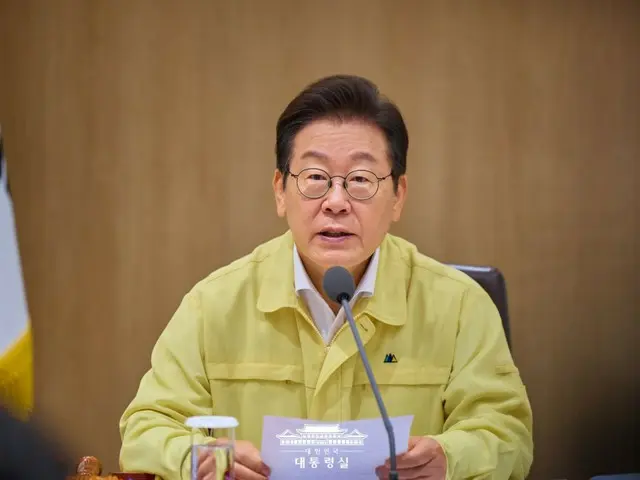The approval rating has been rising since he took office, remaining in the 60% range last month, but has fallen to the 50% range for two consecutive weeks since the start of August. The approval rating of the ruling Democratic Party of Korea has also plummeted. What is the reason for this decline?
Lee, who was elected in the presidential election in June and became the 21st president of South Korea, has been running the government with a "quick decision-making" approach, including quickly selecting cabinet members.
He was invited to attend the G7 Summit held in Kananaskis, western Canada, and made his diplomatic debut early on. During his stay, he spoke with leaders of nine countries and regions about a variety of topics, including economics.
They discussed ways to strengthen cooperation in various fields. He also held the first Japan-Korea summit meeting with Prime Minister Shigeru Ishiba. He has also begun to improve relations with North Korea, which had cooled under the previous administration. Lee's administration has been highly praised, and he has been awarded the 6th
In July, he maintained an approval rating of over 60%. On the 15th of this month, about two months after his inauguration, Lee's "national appointment ceremony" was held at Gwanghwamun Square in Seoul. About 100 people, including ordinary citizens, attended the appointment ceremony.
In front of the audience, Lee read a letter to the people, saying, "As a loyal worker for the people, I will only trust in the people and move forward toward a country where the people are the masters and where the people are happy."
Since taking office, Lee has maintained a strong approval rating, but it has been falling since August. The polling company Realmeter conducted a nationwide survey of 2,000 people aged 18 and over from the 11th to the 14th of this month.
In a survey of 100, Lee's approval rating fell 5.4 percentage points from the previous week to 51.1%, marking the second consecutive week that his approval rating has fallen.
In addition, a survey conducted by the polling organization Gallup Korea from the 12th to the 14th showed that Lee's approval rating had fallen to 59%.
This is the first time that Lee's approval rating has fallen below 50% in a survey conducted over the same period. The most common reason for disapproval was "special pardon" (equivalent to a Japanese amnesty), accounting for 22%.
Lee issued the amnesty on the 15th, the Liberation Day, which commemorates the country's liberation from Japanese colonial rule. A total of 2,188 people were affected, including those accused of falsifying official documents and fraudulent admission of their children to university.
Former Justice Minister Cho Kuk of the minority opposition Fatherland Reform Party, who was serving time in prison for the same crime, and Yoon Mi-hee of a comfort women support group, who was on suspended sentence after being found guilty of embezzling donations for comfort women.
The inclusion of Cho and Yoon, who once caused a stir in the public but were only recently convicted, as recipients of the pardon has drawn criticism from some members of the public, opposition parties, and civic groups.
There were also voices of opposition. Cho is close to the ruling Democratic Party of Korea, and Yoon is a former lawmaker of the same party. The South Korean newspaper Chosun Ilbo also said in an editorial on the 9th that "Just because he is on your side, he should not ignore the feelings of the people."
The approval rating of the Democratic Party of Korea, which supports the Lee administration, is also falling. According to the latest survey by Realmeter, the party's approval rating is at 39.9%, down from the previous year.
This is a sharp drop of 8.5 points from the previous week. It is the first time in seven months that the approval rating has been in the 30% range. In contrast, the approval rating of the opposition People Power Party, which lost power in the recent presidential election, rose 6.4 points to 36.7%.
In response to this result, Ahn Cheol-soo, a prominent member of the People Power Party and a candidate for the upcoming party leadership election, posted on social media on the 18th, "Thank you, Cho Kuk!
Ahn wrote, "President Lee's drop in approval ratings was largely due to the special pardons of former Chairman Cho (of the Fatherland Reform Party) and former Rep. Yoon.
"I'm grateful that President Lee's approval rating has dropped," he said. He added, "It's very close to dropping (President Lee's approval rating) below 50 percent."
Ahn has long been critical of the fact that Cho and Yoon were included in the amnesty.
Ahn, who was attending the Liberation Day ceremony on Sunday, stood up while President Lee was giving a congratulatory speech and unfurled a banner that read, "Oppose the impeachment of Cho Kuk and Yoon Mi-hyang."
He said, "How can we explain to young people and the future generations that we are pardoning Cho Kuk and Yoon Mi-hyang, who are not worthy of pardon? Even if you commit a crime, if you hold power, your crime will be lessened.
It's like they're showing what they will become."
2025/08/21 11:32 KST
Copyrights(C)wowkorea.jp 5

